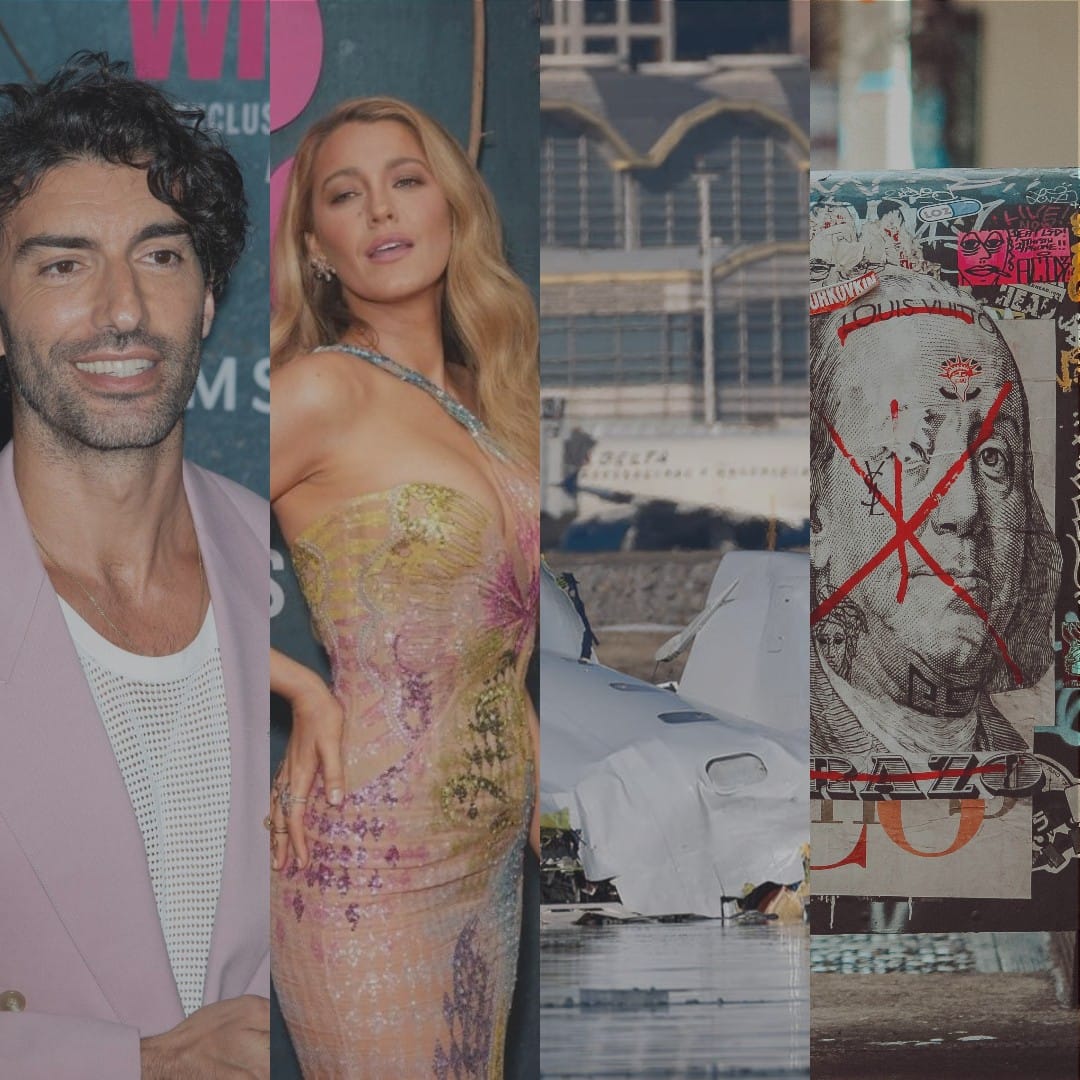The Glamour of Control: How Hollywood Feuds and Falling Skies Expose Capitalism’s House of Cards
What do Blake Lively vs. Justin Baldoni and a midair collision over D.C. have in common? Both expose capitalism’s illusion of control—where power isn’t owned, just borrowed. And when the cracks show? Things collapse. Check out this latest feature on Curated Edge.

By Cece Lowry, Editorial Visionary & Lead Writer, Curated Edge
February 7, 2025
ACT I: The Illusion of Ownership
It always looks so effortless, doesn’t it? The power, the control, the money—the way Hollywood’s elite command red carpets and billion-dollar studios as if they own the industry itself. The way aviation giants sell us the fantasy of seamless global travel, their pristine jets cutting through the sky like polished knives.
But let’s be clear: the people who appear to own these systems don’t. They are not masters of their domain. They are merely the stewards of capital, shepherding it, manipulating it, bending to its will like desperate actors auditioning for a role they already believe they have.
And when that illusion cracks? When the veil slips, and we see what’s really holding it all together?
That’s when things fall apart.
This past month, two seemingly unrelated events—a vicious legal battle between Blake Lively and Justin Baldoni, and a catastrophic midair collision over Washington, D.C.—exposed the fragility of the systems we’ve been conditioned to trust. One was a high-stakes Hollywood scandal playing out like a scripted prestige drama; the other, a terrifying real-world disaster that left no room for rewrites. Both were fueled by the same force: unchecked capitalism, masquerading as control.
ACT II: The Hollywood Power Play
Blake Lively, America’s favorite blonde, vs. Justin Baldoni, the once-beloved heartthrob turned director. It should have been a simple film adaptation—Colleen Hoover’s viral bestseller It Ends With Us was supposed to be a hit. Instead, it became a battleground.
In December 2024, reports surfaced that Lively had accused Baldoni of sexual harassment and workplace intimidation, claiming he retaliated when she attempted to remove him from the project. Baldoni struck back with a $400 million defamation lawsuit, alleging that Lively and her husband, Ryan Reynolds, had orchestrated a smear campaign to force him out and control the film’s branding. The legal papers read less like a contract dispute and more like a psychological thriller, filled with backroom deals, industry betrayals, and the quiet whisper of power shifting hands.
This wasn’t just a fight over a movie. It was about who gets to own the story.
Hollywood runs on an economy of controlled stewardship. The studios don’t truly own the films—they lease power to the biggest players, letting them dictate narratives as long as the illusion holds. But when too many egos, too many millions, and too much unregulated capital clash at once? The system cracks. It’s not built to withstand the weight of its own corruption.
And so, the Lively-Baldoni lawsuit isn't just celebrity gossip—it’s a masterclass in how capital isn’t owned, only borrowed.
ACT III: The Airborne Catastrophe
The illusion of control shattered in a very different way on January 29, 2025, when an American Airlines Bombardier CRJ700 regional jet collided midair with a U.S. Army UH-60 Black Hawk helicopter over the Potomac River in Washington, D.C.
Sixty-seven people lost their lives in an instant.
The Black Hawk, reportedly on a routine training mission, veered off course. The CRJ700, a workhorse of American aviation, was descending toward Reagan National Airport when it was suddenly gone. Two aircraft, piloted by some of the most skilled professionals in the industry, obliterated in an instant.
The immediate questions were technical: Was this pilot error? A miscalculated flight path? A failure in communication?
But as the investigations unfolded, a deeper, systemic failure emerged.
- FAA safety regulations had been loosened under increasing corporate pressure.
- The airline industry, in its relentless pursuit of efficiency, had cut down on pilot training hours and relied on automation to fill the gaps.
- The U.S. military’s aviation fleet, already stretched thin by budget reallocations, had been operating on razor-thin margins.
The Black Hawk was where it shouldn’t have been. The CRJ700 was where it had every right to be. The system had failed them both.
Just like in Hollywood, capital is not owned—it’s stewarded. And in aviation, that stewardship has always been paper-thin, a game of profit margins and just-in-time logistics dressed up as "efficiency." When you stretch an industry too far, something has to break.
And this time, it was metal, flesh, and sky.
ACT IV: The Runway and the Wreckage
Hollywood and aviation have more in common than they seem. Both industries thrive on perception, selling us fantasies of safety, control, and authority.
- The A-list couple, perfectly styled for the camera, but embroiled in legal warfare behind closed doors.
- The airline CEO, delivering polished soundbites about "safety first," while knowing corners have been cut for profit.
- The designer dress, breathtaking in its silhouette, held together with safety pins underneath.
This is the economy we live in—an empire of thin fabrics and thinner lies. The people who appear to control it are not truly in control. They are merely caretakers of capital, making decisions dictated not by morality or long-term stability, but by immediate return on investment.
And when that illusion is stretched too thin?
The seams give way. The planes fall out of the sky. The courtroom battles become bloodier.
The system breaks.
ACT V: Unmasking the Illusion
We are living in a moment where the world’s thinnest institutions are being tested.
- Hollywood’s crisis is a crisis of narrative control. Who owns the stories? Who controls the image? And what happens when capital turns on those who thought they owned it?
- Aviation’s crisis is a crisis of trust. We board planes assuming the system is infallible, but behind the safety briefings are cost-cutting decisions that prioritize profits over people.
And all of this—all of it—is a consequence of capital being shepherded by those who will never take accountability when it collapses.
But here’s the final act: When capital is left unchecked, it always collapses.
And when it does?
Those who believed they were in control—**the CEOs, the studio heads, the regulators, the politicians—**will be nowhere to be found.
But the wreckage will be ours to clean up.
EPILOGUE: The Only Way Forward
This article isn’t just a critique. It’s a call to pay attention. Because what’s happening in Hollywood and what’s happening in our skies are not separate events.
They are symptoms of the same sickness.
The way capital moves through these industries—and the way it’s manipulated, mismanaged, and exploited—is the exact reason systems collapse.
So, here’s the real takeaway:
- If you want to understand where the next great failure of capitalism will be, look at what is most glamorous, most curated, most controlled.
- Look at who is pretending to own something they do not.
Cece Lowry is the Curator in Chief of The Curated Edge, where creativity meets innovation. Her work delves into the intersections of art, lifestyle, entertainment, and storytelling, offering fresh perspectives in a world eager for authenticity and depth.
